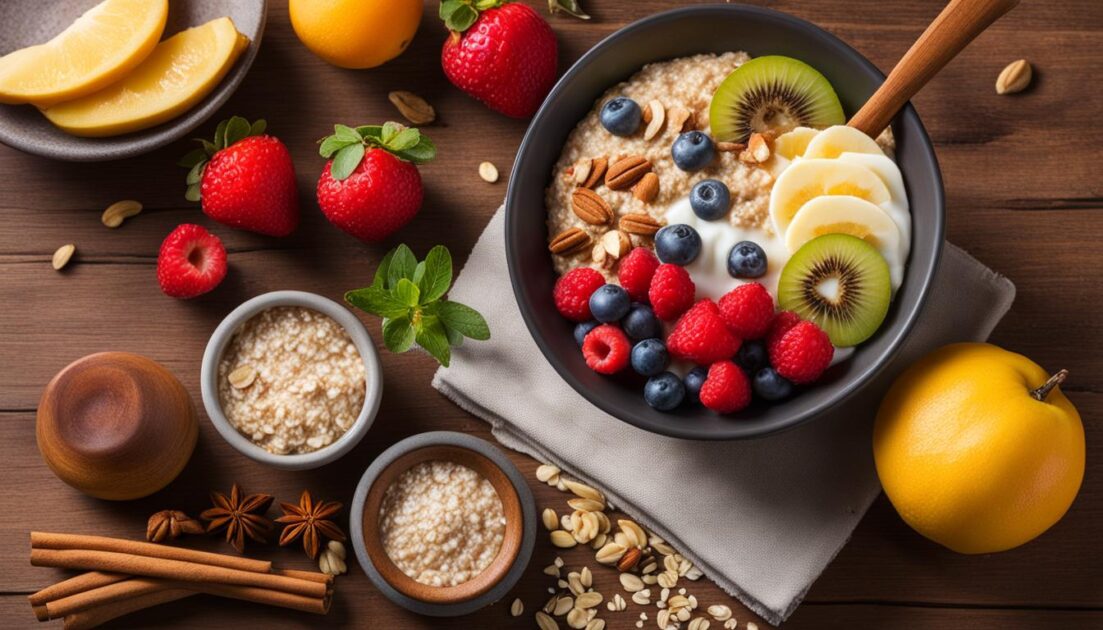When it comes to healthy breakfast options, oatmeal is a classic choice that offers a plethora of uses and benefits. Not only is it a delicious and comforting meal, but it also provides numerous advantages for your health and well-being.
Oats, the main ingredient in oatmeal, are a gluten-free whole grain packed with essential vitamins, minerals, fiber, and antioxidants. This nutritious powerhouse can be enjoyed in a variety of ways, from a warm bowl of oatmeal to being incorporated into baked goods.
Key Takeaways
- Oatmeal is a versatile and healthy breakfast option
- Oats are a gluten-free whole grain
- Oats are rich in vitamins, minerals, fiber, and antioxidants
- Oats can be enjoyed as oatmeal or added to baked goods
- Oatmeal offers a range of health benefits including weight loss, lower blood sugar levels, and reduced risk of heart disease
The Nutritional Value of Oats
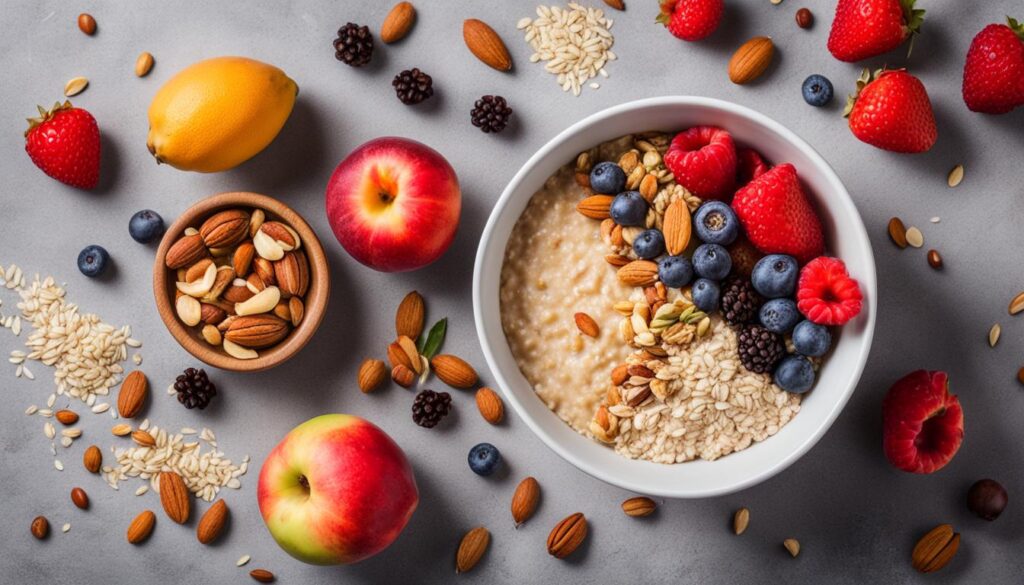
Oats are incredibly nutritious, containing a good balance of carbs, fiber, protein, vitamins, and minerals.
They are rich in manganese, phosphorus, magnesium, copper, iron, zinc, folate, and several B vitamins.
One cup of prepared oatmeal provides 27.4 grams of carbs, 5.3 grams of protein, 2.6 grams of fat, 4 grams of fiber, and 153.5 calories.
Health Benefits of Oats
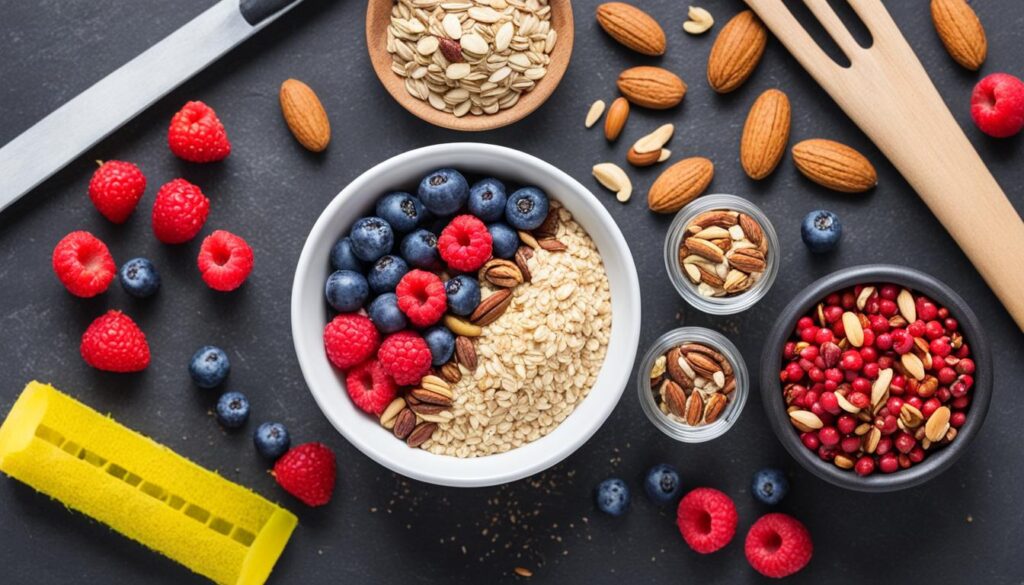
Eating oats and oatmeal can provide a wide range of health benefits. Let’s take a closer look at why oats are considered a healthy addition to your diet.
Weight Loss Support
If you’re looking to shed some extra pounds, incorporating oats into your meals can be a smart move. Oats are high in fiber, which helps you feel fuller for longer and can aid in portion control. By including oats in your diet, you may be able to curb your appetite and reduce calorie intake, ultimately supporting your weight loss goals.
Cholesterol Management
Oats are known for their ability to help lower cholesterol levels. The soluble fiber found in oats, known as beta-glucan, binds to cholesterol in the body and helps remove it through waste. Studies have shown that regularly consuming oats can reduce both total cholesterol and LDL (bad) cholesterol levels, therefore promoting heart health.
Blood Sugar Regulation
For individuals with diabetes or those looking to maintain stable blood sugar levels, oats can be a great option. The fiber content in oats, particularly the beta-glucan fiber, slows down the absorption of glucose into the bloodstream, preventing spikes and crashes in blood sugar levels. This steady release of energy can help manage diabetes and promote overall health.
Heart Health
Not only do oats help lower cholesterol levels, they also promote heart health in other ways. The antioxidants found in oats, such as avenanthramides, help reduce inflammation in the arteries and prevent the oxidation of LDL cholesterol. These actions can decrease the risk of heart disease and support a healthy cardiovascular system.
Gut Health and Digestion
Oats are a great source of dietary fiber, which is essential for maintaining a healthy gut. The fiber in oats adds bulk to the stool, promoting regular bowel movements and preventing constipation. Additionally, the soluble fiber in oats acts as a prebiotic, providing nourishment for beneficial gut bacteria and supporting a healthy digestive system.
| Health Benefit | How Oats Contribute |
|---|---|
| Weight Loss Support | High fiber content helps control appetite and reduce calorie intake. |
| Cholesterol Management | Soluble fiber binds to cholesterol and promotes its removal from the body. |
| Blood Sugar Regulation | Beta-glucan fiber slows down the absorption of glucose into the bloodstream. |
| Heart Health | Antioxidants reduce inflammation in the arteries and protect LDL cholesterol. |
| Gut Health and Digestion | Fiber adds bulk to the stool and acts as a prebiotic for beneficial gut bacteria. |
As you can see, the benefits of eating oats extend beyond basic nutrition. By incorporating oats into your daily routine, you can support weight management, improve heart health, regulate blood sugar levels, promote good gut health, and enhance digestion. So why not start enjoying the benefits of oats today?
Oats and Heart Health
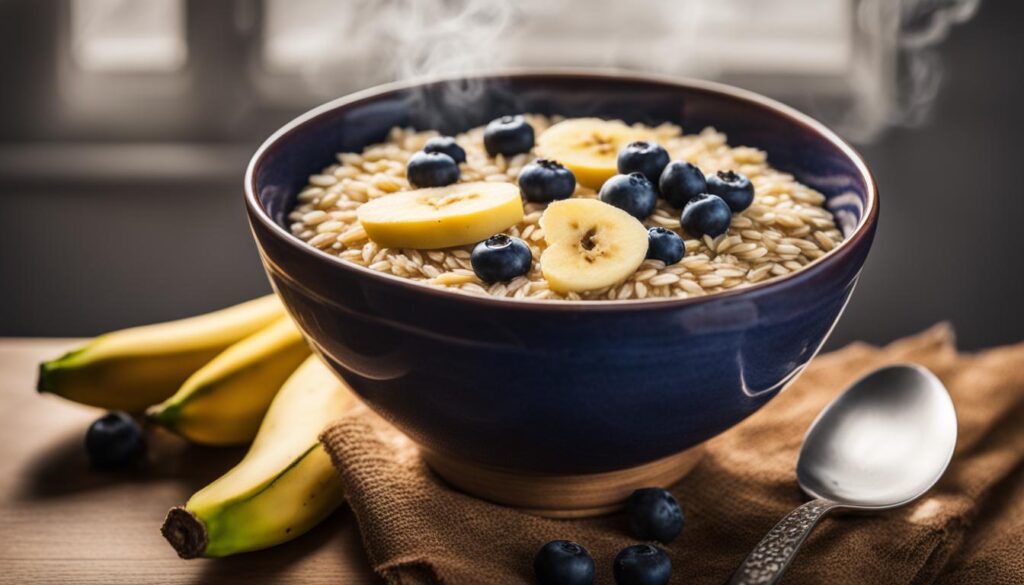
Oats are known for their remarkable benefits in promoting heart health. The key to their heart-protective properties lies in their high content of soluble fiber, specifically beta-glucan.
Studies have shown that consuming oats regularly can help lower both total cholesterol and LDL (bad) cholesterol levels, which are significant risk factors for heart disease. The soluble fiber in oats acts as a sponge, binding to cholesterol in the digestive tract and preventing it from being absorbed into the bloodstream.
Moreover, beta-glucan also plays a crucial role in protecting LDL cholesterol from oxidation. When LDL cholesterol is oxidized, it becomes more harmful and can contribute to the development of plaque in the arteries, leading to atherosclerosis.
Research has demonstrated that incorporating oats into a heart-healthy diet can result in notable reductions in LDL cholesterol levels, thereby significantly reducing the risk of heart disease.
To visualize the cholesterol-lowering effects of oats, consider the following table:
| Study | Duration | Participants | Cholesterol Reduction |
|---|---|---|---|
| Study 1 | 6 weeks | 50 individuals with high cholesterol | 8% reduction in LDL cholesterol |
| Study 2 | 12 weeks | 100 individuals with type 2 diabetes | 5% reduction in total cholesterol |
| Study 3 | 8 weeks | 70 postmenopausal women | 10% reduction in LDL cholesterol |
As shown in the table, studies have consistently demonstrated the positive impact of oats on cholesterol levels.
Incorporating oats into your daily diet, such as by enjoying a bowl of oatmeal for breakfast or adding oats to smoothies, baked goods, or yogurt, can contribute significantly to maintaining a healthy heart.
Oats and Blood Sugar Regulation
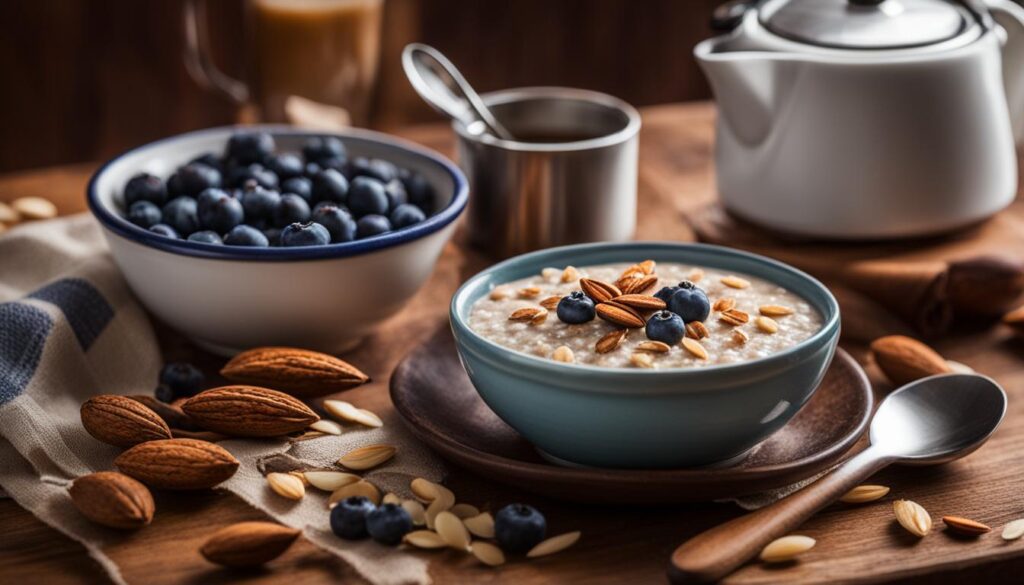
Oats can play a crucial role in managing blood sugar levels, making them an excellent choice for individuals with obesity or type 2 diabetes. The high content of beta-glucan fiber in oats creates a gel-like substance in the gut, which slows down the absorption of glucose into the bloodstream. This mechanism helps prevent sudden spikes in blood sugar levels after meals and assists in maintaining stable glucose levels throughout the day.
The beta-glucan fiber in oats acts as a barrier between carbohydrates and the bloodstream, allowing for a slower release of glucose. This gradual release helps prevent drastic fluctuations in blood sugar, which can contribute to better blood sugar control and overall diabetes management.
Furthermore, oats have a low glycemic index (GI), which means they have a less pronounced effect on blood sugar levels compared to high-GI foods. Including oats in your diet can help prevent sharp rises and drops in blood sugar, providing a steady and sustained source of energy.
| Benefit | Explanation |
|---|---|
| Stabilizes blood sugar levels | The beta-glucan fiber in oats forms a gel-like substance in the gut, slowing down the absorption of glucose into the bloodstream. |
| Low glycemic index | Oats have a low glycemic index, meaning they have a minimal impact on blood sugar levels. |
| Provides sustained energy | The slow release of glucose from oats helps maintain stable blood sugar levels and prevents energy crashes. |
If you have diabetes or are looking to improve your blood sugar control, consider incorporating oats into your daily diet. Whether consumed as oatmeal for breakfast or used in baked goods and snacks, oats offer a convenient and nutritious way to manage blood sugar and support overall health.
Oats for Weight Loss
When it comes to weight management, oats are a powerhouse. The filling properties of oats make them an excellent choice for those looking to lose weight. The secret lies in the beta-glucan fiber found in oats, which increases the feeling of fullness and can help reduce calorie intake.
When you consume oats, the beta-glucan forms a gel-like substance in your stomach, delaying the empting process and keeping you satisfied for longer. This can help control your appetite and prevent overeating, making oats a valuable addition to any weight loss plan.
Not only are oats low in calories, but they also offer a wealth of other nutrients, including vitamins, minerals, and antioxidants. This ensures that you’re getting a well-rounded and nourishing meal while working towards your weight loss goals.
“Oats are a filling food that can aid in weight loss. The beta-glucan fiber in oats increases the feeling of fullness and can reduce calorie intake.”
Oats for Skin Care

Oats have long been recognized for their exceptional benefits in skincare. With their soothing and moisturizing properties, oats are a natural solution for various skin concerns. One particularly effective form of oats for skin care is colloidal oatmeal, which is made from finely ground oats. Colloidal oatmeal has been approved by the FDA as a skin-protective substance, making it a trusted ingredient in many skincare products.
Colloidal oatmeal offers multiple benefits for the skin, including its ability to relieve dryness and itchiness. It is especially beneficial for conditions such as eczema, as it helps soothe the skin and alleviate associated symptoms. The oats’ natural compounds create a protective barrier on the skin, locking in moisture and preventing further dryness.
Oats contain bioactive components, including antioxidants and anti-inflammatory properties, that promote healthy and radiant skin. These properties help combat oxidative stress and inflammation, which can contribute to skin aging and various skin conditions. By incorporating oats into your skincare routine, you can support the overall health and appearance of your skin.
The Benefits of Oats for Skin
- Moisturization: Oats have excellent moisture-retaining properties, helping to keep the skin hydrated and nourished.
- Soothing Irritation: Oats possess anti-inflammatory properties that can calm and soothe irritated skin, reducing redness and discomfort.
- Relieving Itchiness: Colloidal oatmeal can effectively relieve itchiness caused by dry skin, insect bites, or certain skin conditions.
- Improving Skin Barrier: Oats help strengthen the skin barrier, enhancing its ability to retain moisture and protect against external aggressors.
- Exfoliation: The slight abrasiveness of oats can gently exfoliate the skin, removing dead cells and promoting a smoother complexion.
Incorporating oats into your skincare routine can be as simple as creating a homemade oatmeal face mask or using skincare products formulated with oat extract or colloidal oatmeal. These products can provide the skin with the nourishing benefits of oats, promoting a healthier and more vibrant complexion.
To showcase how oats can benefit skin health, here is a table summarizing the various advantages:
| Advantages of Oats for Skin |
|---|
| Moisturization |
| Soothing Irritation |
| Relieving Itchiness |
| Improving Skin Barrier |
| Exfoliation |
With its numerous benefits, oats are a versatile and natural ingredient to incorporate into your skincare routine, helping you achieve healthier and more radiant skin.
Oats and Asthma Prevention
While oats are widely known for their health benefits, some studies suggest that they may also play a role in preventing the development of asthma in young infants. Although more research is needed to confirm these findings, it is worth exploring the potential protective effects of oats against this respiratory condition.
“Introducing oats to young infants may help prevent the development of asthma.”
Asthma is a chronic inflammatory disease of the airways that affects millions of individuals worldwide. It is characterized by symptoms such as wheezing, shortness of breath, coughing, and chest tightness. While the exact cause of asthma remains unknown, certain factors such as genetics, environmental triggers, and immune system dysfunction are believed to contribute to its development.
Oats are a rich source of various nutrients, including vitamins, minerals, and antioxidants. Their high fiber content, particularly beta-glucans, has been associated with numerous health benefits, such as reducing cholesterol levels, improving heart health, and promoting healthy digestion. However, the potential connection between oats and asthma prevention is a relatively recent area of interest.
One study published in the Journal of Allergy and Clinical Immunology: In Practice investigated the association between oat consumption and the risk of asthma in children. The study found that children who were introduced to oats as part of their complementary diet at six months of age had a lower risk of developing asthma by the age of five compared to those who were not exposed to oats. The researchers hypothesized that the immune-modulating properties of oats, including their ability to reduce inflammation, could contribute to this protective effect against asthma.
It is important to note that the introduction of oats to infants should be done with caution, as some individuals may have an allergic reaction to oats. If you have concerns about introducing oats to your child, it is recommended to consult with a healthcare professional.
Oats and Digestive Health
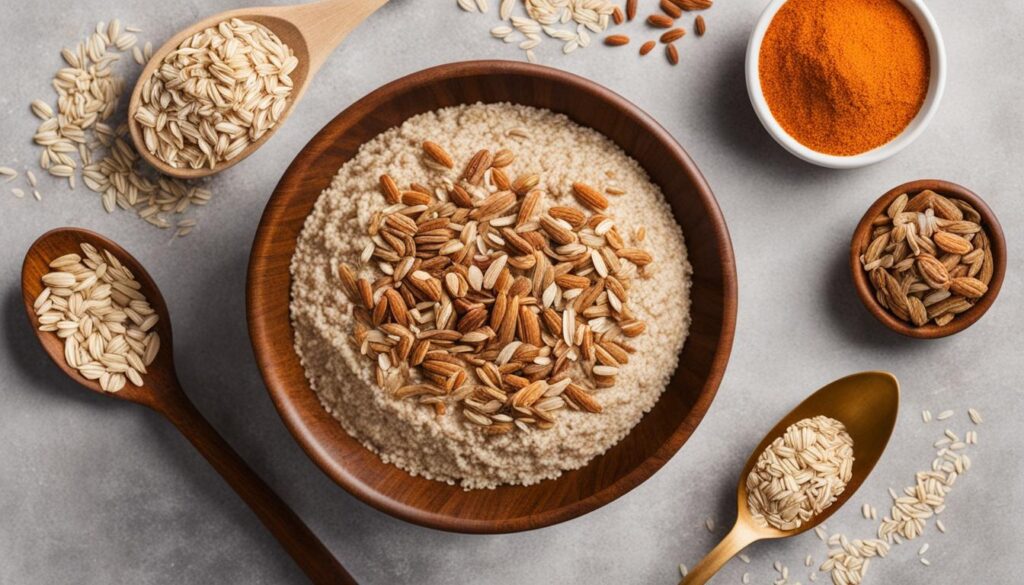
When it comes to promoting digestive health, oats have proven to be a beneficial addition to your diet. Specifically, oat bran, which is the fiber-rich outer layer of oats, can play a significant role in relieving constipation and improving digestion.
Oat bran is packed with soluble and insoluble fiber, both of which are essential for maintaining a healthy digestive system. Soluble fiber adds bulk to your stool and helps prevent constipation by absorbing water and softening your bowel movements. Insoluble fiber, on the other hand, contributes to a more efficient digestion process by speeding up the movement of food through your intestines.
Research has demonstrated that including oat bran in your diet can increase stool bulk, making it easier to pass and reducing the likelihood of constipation. Additionally, oat bran’s high fiber content encourages the growth of beneficial gut bacteria, further supporting digestive health.
However, it’s important to note that while oats and oat bran can be effective in relieving constipation, they may be less effective in cases of opioid-induced constipation, which is commonly associated with the use of certain pain medications.
Incorporating oat bran into your daily routine is easy and versatile. You can add it to your oatmeal, smoothies, or baked goods for a fiber-rich boost. It’s important to remember to drink plenty of water when increasing your fiber intake, as this will help prevent any potential digestive discomfort.
The Benefits of Oat Bran for Digestive Health:
| Benefits | How Oat Bran Helps |
|---|---|
| Relieves constipation | Oat bran adds bulk to stool and promotes regular bowel movements. |
| Improves digestion | The high fiber content in oat bran aids in the efficient movement of food through the digestive system. |
| Supports gut health | Oat bran promotes the growth of beneficial gut bacteria, contributing to a healthy digestive system. |
“Incorporating oat bran into your diet can have a positive impact on digestive health, relieving constipation and improving overall digestion. Its high fiber content adds bulk to stool, while also supporting the growth of beneficial gut bacteria. By including oat bran in your daily routine, you can promote a healthy digestive system.”
How to Incorporate Oats into Your Diet
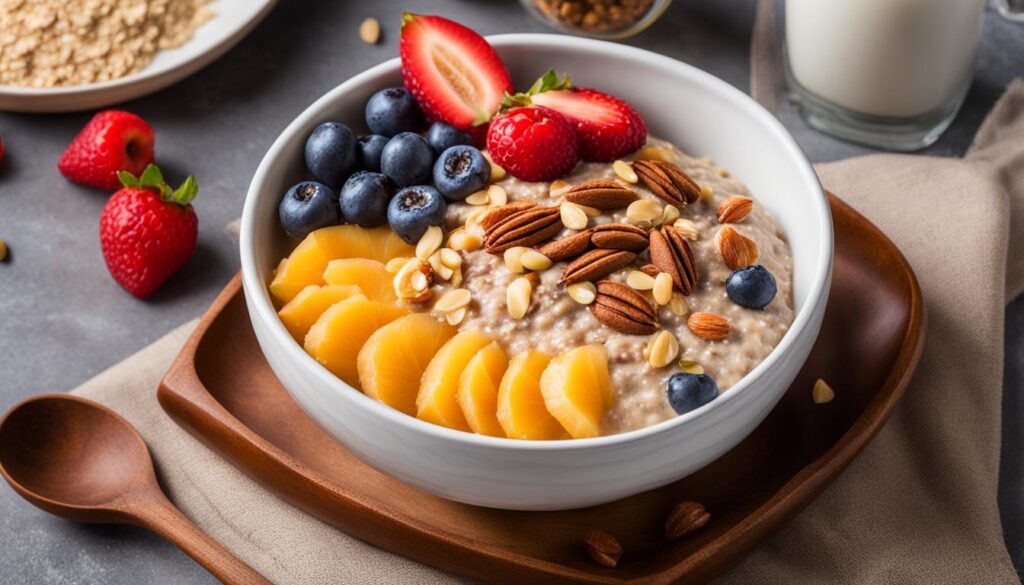
There are numerous delicious ways to incorporate oats into your daily diet and enjoy the many health benefits they offer. From traditional oatmeal recipes to creative uses in both sweet and savory dishes, oats can add nutrition and flavor to your meals. Here are some ideas to get you started:
1. Oatmeal for Breakfast
Start your day with a warm and comforting bowl of oatmeal. Simply boil oats in water or milk and customize your bowl with a variety of toppings. Add fresh fruits like berries or sliced bananas, along with a sprinkle of nuts, seeds, or a drizzle of honey for added flavor and nutrition.
2. Baked Goods
Add oats to your favorite baked goods for a wholesome twist. Substitute a portion of flour with oats in muffins, cookies, and bread recipes. The oats will add texture and a nutty flavor to your treats while boosting their nutritional profile.
3. Granola and Muesli
Create your own homemade granola or muesli by combining oats with nuts, dried fruits, and a touch of sweetness. Bake the mixture until golden and crunchy, and enjoy it as a topping for yogurt or a quick on-the-go snack.
4. Yogurt Parfaits
Layer oats, yogurt, and fresh fruits in a glass to create a delicious and nutritious parfait. Experiment with different flavor combinations and textures to make your yogurt parfait a refreshing and satisfying meal or snack.
5. Savory Dishes
Think beyond breakfast and sweet treats! You can also incorporate oats into savory dishes for added nutrition and a delightful texture. Use oats as a binder in veggie burgers, meatloaf, or as a crispy topping for casseroles and baked dishes.
Oats are a versatile ingredient that can be used in a variety of dishes, both sweet and savory. Experiment with different recipes to discover your favorite way to cook and enjoy oats.
Oats are a versatile ingredient that can be used in a variety of dishes, both sweet and savory. Experiment with different recipes to discover your favorite way to cook and enjoy oats.
By incorporating oats into your diet, you can enjoy their nutritional benefits and add variety to your meals. Whether you prefer a comforting bowl of oatmeal or a creative oat-based recipe, cooking with oats is an excellent way to promote a healthy lifestyle.
Choosing and Storing Oats
When it comes to selecting oats for your pantry, opting for less processed varieties like rolled or steel-cut oats is the way to go. These types of oats retain more of their natural nutrients and texture compared to instant or flavored versions.
If you have celiac disease or a gluten sensitivity, it’s important to look for certified gluten-free oats. This ensures that they have been carefully processed and tested to meet strict gluten-free standards.
To maintain the freshness and quality of your oats, proper storage is key. Keep them in a cool, dry place, such as a kitchen cupboard or pantry, away from heat and humidity. It’s also important to store oats in an airtight container to protect them from moisture and pests. This will help extend their shelf life and prevent them from becoming stale.
Additionally, it’s advisable to keep oats away from strong-smelling foods, as they can easily absorb odors. This will help preserve the natural flavors of your oats and prevent them from taking on unwanted aromas.
FAQ
What are the uses and benefits of oatmeal?
Oatmeal can be used in a variety of ways, including for breakfast or as an ingredient in baked goods. It offers numerous health benefits, such as aiding in weight loss, lowering blood sugar levels, and reducing the risk of heart disease.
What is the nutritional value of oats?
Oats are packed with essential nutrients, including carbs, fiber, protein, vitamins, and minerals. They contain manganese, phosphorus, magnesium, copper, iron, zinc, folate, and several B vitamins. One cup of prepared oatmeal provides 27.4 grams of carbs, 5.3 grams of protein, 2.6 grams of fat, 4 grams of fiber, and 153.5 calories.
What are the health benefits of oats?
Eating oats has been linked to various health benefits, such as weight loss, lower cholesterol levels, regulated blood sugar, improved heart health, and gut health. The high fiber content and unique antioxidants in oats contribute to these health benefits.
How do oats help with heart health?
Oats are particularly beneficial for heart health. The soluble fiber, beta-glucan, found in oats has been shown to reduce total cholesterol and LDL (bad) cholesterol levels. They may also protect LDL cholesterol from oxidation, a crucial step in the development of heart disease.
Can oats help regulate blood sugar levels?
Yes, oats can help regulate blood sugar levels, especially in people with obesity or type 2 diabetes. The beta-glucan fiber in oats forms a thick gel in the gut, which slows down the absorption of glucose into the bloodstream. This can help prevent spikes in blood sugar levels after meals.
Are oats beneficial for weight loss?
Yes, oats can aid in weight loss. The beta-glucan fiber in oats increases the feeling of fullness and can reduce calorie intake. By delaying the emptying of the stomach, oats help control your appetite and prevent overeating.
How can oatmeal be used for skincare?
Oats have soothing and moisturizing properties, making them beneficial for skincare. Finely ground oats, known as colloidal oatmeal, can help relieve symptoms of dry and itchy skin. It has even been approved by the FDA as a skin-protective substance.
Can oatmeal help prevent asthma?
Some studies suggest that introducing oats to young infants may help prevent the development of asthma. However, more research is needed to confirm these findings and understand the mechanisms behind the potential protective effects of oats against asthma.
How do oats promote digestive health?
Oat bran, the fiber-rich outer layer of oats, has been shown to relieve constipation and promote regular bowel movements. It can increase stool bulk and improve digestion. However, oats may be less effective against opioid-induced constipation.
How can I incorporate oats into my diet?
There are numerous ways to include oats in your diet. You can make oatmeal for breakfast by boiling oats in water or milk and adding fruits, nuts, and seeds. Oats can also be included in baked goods, granola, muesli, yogurt, and savory dishes like lentil loaf or crisp toppings.
What should I consider when choosing and storing oats?
When selecting oats, opt for less processed varieties like rolled or steel-cut oats. Look for certified gluten-free options if you have celiac disease or gluten sensitivity. Store oats in a cool, dry place in an airtight container to maintain their freshness. Avoid keeping oats near strong-smelling foods as they can absorb odors.
